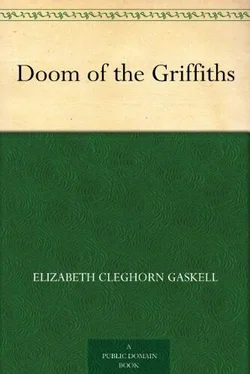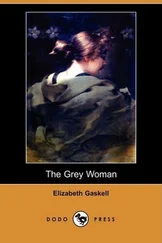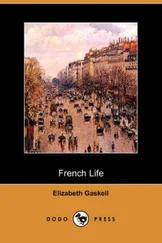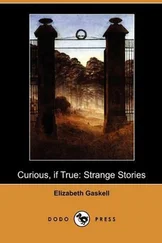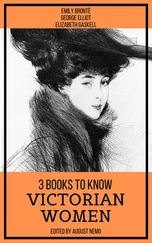THE DOOM OF THE GRIFFITHS
by Elizabeth Gaskell
I have always been much interested by the traditions which are scattered up and down North Wales relating to Owen Glendower (Owain Glendwr is the national spelling of the name), and I fully enter into the feeling which makes the Welsh peasant still look upon him as the hero of his country. There was great joy among many of the inhabitants of the principality, when the subject of the Welsh prize poem at Oxford, some fifteen or sixteen years ago, was announced to be "Owain Glendwr." It was the most proudly national subject that had been given for years.
Perhaps, some may not be aware that this redoubted chieftain is, even in the present days of enlightenment, as famous among his illiterate countrymen for his magical powers as for his patriotism. He says himself — or Shakespeare says it for him, which is much the same thing —
'At my nativity
The front of heaven was full of fiery shapes
Of burning cressets. .
. . I can call spirits from the vasty deep.
And few among the lower orders in the principality would think of asking Hotspur's irreverent question in reply.
Among other traditions preserved relative to this part of the Welsh hero's character, is the old family prophecy which gives title to this tale. When Sir David Gam, "as black a traitor as if he had been born in Builth," sought to murder Owen at Machynlleth, there was one with him whose name Glendwr little dreamed of having associated with his enemies. Rhys ap Gryfydd, his "old familiar friend," his relation, his more than brother, had consented unto his blood. Sir David Gam might be forgiven, but one whom he had loved, and who had betrayed him, could never be forgiven. Glendwr was too deeply read in the human heart to kill him. No, he let him live on, the loathing and scorn of his compatriots, and the victim of bitter remorse. The mark of Cain was upon him.
But before he went forth — while he yet stood a prisoner, cowering beneath his conscience before Owain Glendwr — that chieftain passed a doom upon him and his race:
"I doom thee to live, because I know thou wilt pray for death. Thou shalt live on beyond the natural term of the life of man, the scorn of all good men. The very children shall point to thee with hissing tongue, and say, 'There goes one who would have shed a brother's blood! For I loved thee more than a brother, oh Rhys ap Gryfydd! Thou shalt live on to see all of thy house, except the weakling in arms, perish by the sword. Thy race shall be accursed. Each generation shall see their lands melt away like snow; yea their wealth shall vanish, though they may labour night and day to heap up gold. And when nine generations have passed from the face of the earth, thy blood shall no longer flow in the veins of any human being. In those days the last male of thy race shall avenge me. The son shall slay the father."
Such was the traditionary account of Owain Glendwr's speech to his once-trusted friend. And it was declared that the doom had been fulfilled in all things; that live in as miserly a manner as they would, the Griffiths never were wealthy and prosperous — indeed that their worldly stock diminished without any visible cause.
But the lapse of many years had almost deadened the wonder-inspiring power of the whole curse. It was only brought forth from the hoards of Memory when some untoward event happened to the Griffiths family; and in the eighth generation the faith in the prophecy was nearly destroyed, by the marriage of the Griffiths of that day, to a Miss Owen, who, unexpectedly, by the death of a brother, became an heiress — to no considerable amount, to be sure, but enough to make the prophecy appear reversed. The heiress and her husband removed from his small patrimonial estate in Merionethshire, to her heritage in Caernarvonshire, and for a time the prophecy lay dormant.
If you go from Tremadoc to Criccaeth, you pass by the parochial church of Ynysynhanarn, situated in a boggy valley running from the mountains, which shoulder up to the Rivals, down to Cardigan Bay. This tract of land has every appearance of having been redeemed at no distant period of time from the sea, and has all the desolate rankness often attendant upon such marshes. But the valley beyond, similar in character, had yet more of gloom at the time of which I write. In the higher part there were large plantations of firs, set too closely to attain any size, and remaining stunted in height and scrubby in appearance. Indeed, many of the smaller and more weakly had died, and the bark had fallen down on the brown soil neglected and unnoticed. These trees had a ghastly appearance, with their white trunks, seen by the dim light which struggled through the thick boughs above. Nearer to the sea, the valley assumed a more open, though hardly a more cheerful character; it looked dark and overhung by sea-fog through the greater part of the year, and even a farm- house, which usually imparts something of cheerfulness to a landscape, failed to do so here. This valley formed the greater part of the estate to which Owen Griffiths became entitled by right of his wife. In the higher part of the valley was situated the family mansion, or rather dwelling-house, for «mansion» is too grand a word to apply to the clumsy, but substantially-built Bodowen. It was square and heavy-looking, with just that much pretension to ornament necessary to distinguish it from the mere farm-house.
In this dwelling Mrs. Owen Griffiths bore her husband two sons— Llewellyn, the future Squire, and Robert, who was early destined for the Church. The only difference in their situation, up to the time when Robert was entered at Jesus College, was, that the elder was invariably indulged by all around him, while Robert was thwarted and indulged by turns; that Llewellyn never learned anything from the poor Welsh parson, who was nominally his private tutor; while occasionally Squire Griffiths made a great point of enforcing Robert's diligence, telling him that, as he had his bread to earn, he must pay attention to his learning. There is no knowing how far the very irregular education he had received would have carried Robert through his college examinations; but, luckily for him in this respect, before such a trial of his learning came round, he heard of the death of his elder brother, after a short illness, brought on by a hard drinking-bout. Of course, Robert was summoned home, and it seemed quite as much of course, now that there was no necessity for him to "earn his bread by his learning," that he should not return to Oxford. So the half-educated, but not unintelligent, young man continued at home, during the short remainder of his parent's lifetime.
His was not an uncommon character. In general he was mild, indolent, and easily managed; but once thoroughly roused, his passions were vehement and fearful. He seemed, indeed, almost afraid of himself, and in common hardly dared to give way to justifiable anger — so much did he dread losing his self-control. Had he been judiciously educated, he would, probably, have distinguished himself in those branches of literature which call for taste and imagination, rather than any exertion of reflection or judgment. As it was, his literary taste showed itself in making collections of Cambrian antiquities of every description, till his stock of Welsh MSS. would have excited the envy of Dr. Pugh himself, had he been alive at the time of which I write.
There is one characteristic of Robert Griffiths which I have omitted to note, and which was peculiar among his class. He was no hard drinker; whether it was that his head was easily affected, or that his partially-refined taste led him to dislike intoxication and its attendant circumstances, I cannot say; but at five-and-twenty Robert Griffiths was habitually sober — a thing so rare in Llyn, that he was almost shunned as a churlish, unsociable being, and paused much of his time in solitude.
Читать дальше
